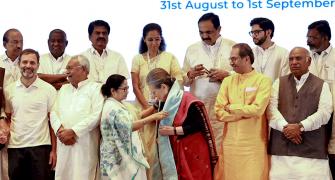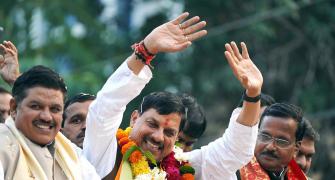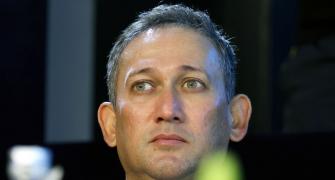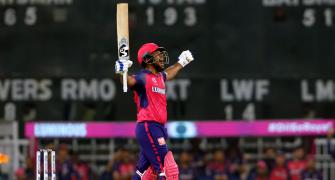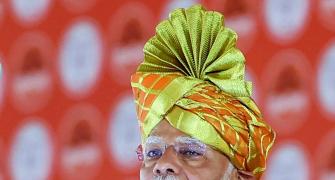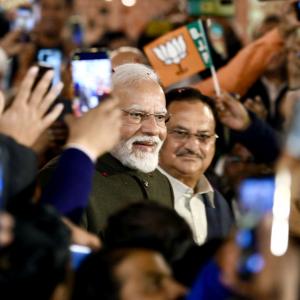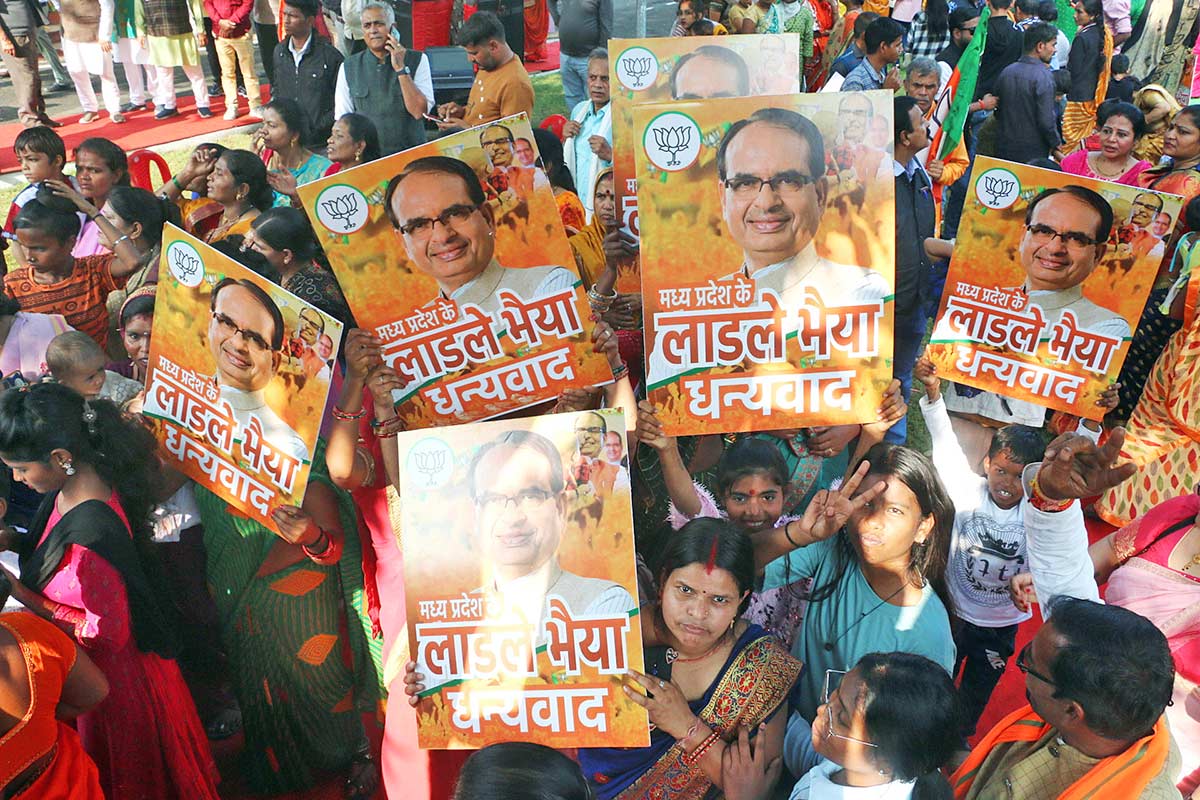Even if the BJP gets 60, 70, or even 100 per cent of the votes in the seats where it scored more than 50 per cent in the 2019 Lok Sabha election, these will still add up to only 224 seats, argues Shekhar Gupta.

The argument that Indian polity is divided into a BJP-loving North and a South that continues to reject it is lazy and simplistic. The contest for 2024 is between the 'BJP heartland' and the peripheries
An intriguing new North-South binary has emerged in our political debate after the elections in four major states last month.
The argument might look persuasive -- that the Bharatiya Janata Party rules the North and the South continues to reject it, creating a horizontal divide in the Indian polity marked by the Vindhyas.
I have used the description 'intriguing' as a euphemism for the kind of simplistic and lazy theorising that calls for something stronger.
First of all, the challenge to the BJP's supremacy is not limited to the South.
A quick look at the political map of India will show that the BJP is not a North-centric party but a party of its own heartland.
If the BJP is out of power in the entire South, it is also, at best, marginal all along the eastern seaboard, including West Bengal, Odisha, Andhra Pradesh, and indeed, Tamil Nadu in the South.
Then, let's turn to the western coastal states. The BJP rules Gujarat and tiny Goa. In Maharashtra, it's in a coalition where it has had to concede the chief ministership to a partner.
The remaining western coastal states, Karnataka and Kerala, are with the Opposition.
Will you still call it a North-South divide? Or, on the contrary, it is the BJP's great limitation in reaching out to the peripheries, and coastal states, while it is able to win enough Lok Sabha seats in its own political heartland?
Again, if we limit our argument to a lazy and simplistic North-South divide, where will the North East feature?
The important fact is that the BJP, despite its powerful and all-conquering image, still does not reach anywhere near the pan-Indian pre-eminence the Congress had during the Indira Gandhi era.
We are keeping Rajiv Gandhi's 414-seat Lok Sabha score of 1984 out as an exception.
In the 'normal' Indira era from 1971 onwards, the Congress got seats from across the country and generally remained in the 350-seat ballpark.
The Modi-Shah BJP demolished all opposition in the Hindi states in 2019, besides Maharashtra, Gujarat and Karnataka, to reach its highest ever tally of 303.
Brave words from its campaigners apart, a look at India's political map highlights the challenge the BJP faces in reaching that 350-seat mark.
Will we now say that besides a North-South divide, there is also a North-East divide?
Or can we say that every state where Hindi is the dominant language and the BJP the leading party, by implication, is northern?
Is Madhya Pradesh a northern state? Bihar may be at a stretch because it reaches out to the northern borders with Nepal, but what about Chhattisgarh and Jharkhand?
These are central, or east-central states.
The short point is, it is impossible to analyse Indian politics along regional or geographical dividing lines.
While we question the idea of the North-South divide on facts, we might also check out the principle underlying the argument.
For now, the argument seems to be that the less advanced, educated, progressive and by implication more bigoted North unquestioningly votes for Narendra Modi's BJP, while the South stands apart in a more sensible, honourable contrast.
It is just that the South does not have the numbers to save India from Mr Modi, goes the argument.
Further, as and when a fresh delimitation is carried out, likely after the next census, the 'civilised' South will become even more marginalised.
Generalisations like these are perilous. Geographically, we have already demonstrated that the BJP's challenge isn't exactly North versus South, but the heartland versus the peripheries.
The party is radiating outwards from the centre (Madhya Pradesh has been its strongest base) and hasn't quite established itself in many of the coastal states in the south, east and west.
Further, if you make the qualitative argument, how would you explain the 1977 election result?
Then, what is being erroneously called the 'North' today, or mainly the Hindi states, rejected Mrs Gandhi's Congress, punishing it for the excesses of the Emergency.
The states in the South had a totally contrary response.
The Congress won most of its 154 seats from the southern states.
In the states the BJP sweeps now, Uttar Pradesh, Madhya Pradesh, Bihar (undivided then), Rajasthan and Haryana, the Congress won just two seats.
Both Indira Gandhi and Sanjay Gandhi lost their seats of Rae Bareli and Amethi.

That result, therefore, wasn't so different from the situation in 2019.
Would we, therefore, conclude that in 1977, the 'North' was more politically evolved and aware while the South was blindly following Indira Gandhi?
Or that the North cared about liberties and rejected the Emergency, while the South was illiberal and insensitive?
I know that it sounds ugly when put like this, exactly as the 'South-is-smarter-because-it-isn't-voting-bigoted-BJP' does.
The hard political fact is that the BJP's critics let themselves down when they speak of the North-South divide with resignation.
As our analysis shows, India's current political geographies display the BJP's strengths as well as vulnerabilities.
Once its challengers see things that way, the picture will not look so hopeless.
Nobody understands this better than the BJP. It is because of that hard-headed realism instead of overconfidence that the party keeps winning.
While the BJP seems to psych out all rivals by winning in what look like sweeps, its geographical limitations are all too evident.
The party has already maxed out in its key states. Its dominance is also made to look exaggerated by the margins of its Lok Sabha victories in these states.

In 2019, for example, it secured more than 50 per cent of the votes in 224 seats, which is a killer in any first-past-the-post system.
Most of these seats were obviously in what we might call the BJP heartland states (these include 22 in Karnataka).
For all the talk of its invincibility, in the rest of the country, that is, out of the remaining 319 seats, it won only 79, taking its tally to 303.
That leaves just a 31-seat headroom over the 272 majority mark.
The BJP think-tank understands and worries about this. Even if the party gets 60, 70, or even 100 per cent of the votes in the seats where it scored more than 50 per cent, these will still add up to only 224.
The BJP will need, therefore, all the seats it won in Maharashtra, West Bengal, Odisha, Telangana and West Bengal.
These are precisely the states where the party collected those remaining 79 to take it to 303.
These are also the states where the INDIA alliance might carry weight if its leaders can ensure vote transfers.
That's the reason the BJP focuses so intensely on attacking this idea of INDIA.
This is how the contest for 2024 is set up. It's the BJP heartland versus the rest, especially the peripheries.
One thing it won't be is merely North versus South, as the BJP's dismayed and demoralised critics now unwisely argue.
By special arrangement with The Print
Feature Presentation: Aslam Hunani/Rediff.com



